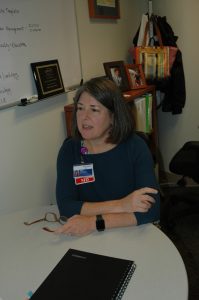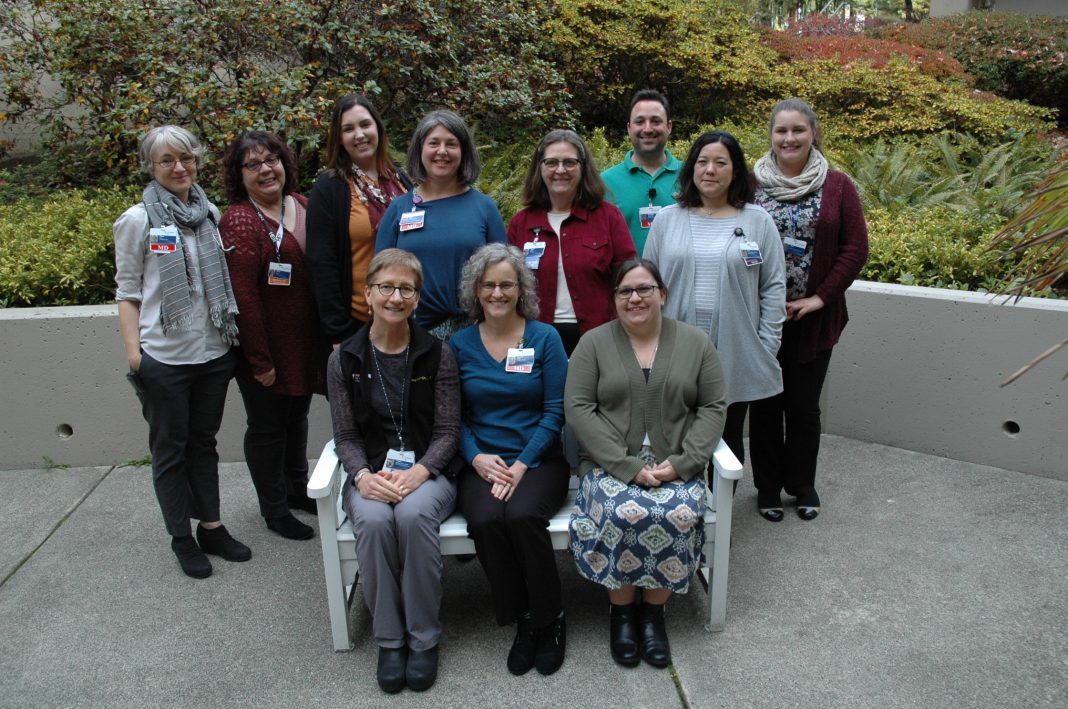Among families of seriously ill patients, a common reaction occurs the first time they meet Robin Stahley: relief. As the clinical lead for Inpatient Palliative Care Services at Providence St. Peter’s Hospital, Stahley’s job is to create a communication path/pathway between families and the medical team and ensure that the patient’s wishes and values are honored in the treatment process.

“I tell people, ‘You’re seeing a lot of different doctors and hearing many different messages,’” says Stahley. “‘I’m here to help clarify what’s happening.’ They love that someone is offering that to them.”
At any given, time the St. Peter’s campus has between 25 to 30 palliative care patients and the Providence Centralia campus has approximately 10 to 20 while the outpatient clinic in Olympia sees around 8 patients per day. Conditions include advanced heart, liver, kidney and lung disease, cancer, dementia, ALS, Multiple Sclerosis, and others. Patients can seek care at any stage if they have a high burden of symptoms or a high burden of stress and anxiety related to their illness simply by asking their primary care provider or specialist to refer them.
Although palliative care has been around since the late 1960s, the practice is still new for many hospitals and patients often confuse it with hospice care. Like hospice, palliative care is specialized treatment for people with serious illnesses. Unlike hospice, patients don’t need to have a medical professional certify them as being in the last six months of their lives to qualify for it. Patients can also pursue curative and life-prolonging therapies at the same time that they are receiving palliative care.
“We see a really wide range of medical problems and issues that are causing stress for people that are ill and their families,” says Stahley “We talk to them about their illness and what they understand about it, what resources they might need as it progresses and about their personal values and what’s important to them as they move forward. It’s important to have a really thorough conversation about that.”
As Dr. Atul Gwande explained in his bestseller “Being Mortal,” everyone has different desires when it comes to how to handle a serious medical issue or end of life situation, but as a society we’re reluctant to talk about the subject.

“We start with a patient’s priorities and values and preferences and then try to make sure that the medical care they get fits with that,” says Dr. Sarah Merrifield, Providence’s Medical Director of Palliative Care for Southwest Washington. “One person might be willing to go through a lot of medical procedures and interventions in the hope of longer life and another might prioritize time outside of the hospital.”
Patients’ wishes are not always clear, particularly in cases where cognitive function has declined. “Often we’re trying to help families take a little nugget of information they might have, like ‘My mom said she would never want to live in a nursing home’ and apply it to whatever medical decisions they’re having to make,” says Dr. Merrifield.
The interdisciplinary palliative care team is comprised of 30 professionals from different fields including doctors, nurse practitioners, registered nurses, social workers, chaplains and pharmacists. The group meets every morning to share information and develop treatment plans for individual patients. “That’s our strength,” says Dr. Merrifield. “We’re considering the input of the different disciplines together. We’re communicating with the referring provider, the consulting providers, the therapists who’re taking care of them and we’re making sure that everyone is hearing what’s important to the patient and their family.”
The team also assists doctors and nurses who have had years of training but were never taught how to have difficult conversations with patients about serious illness. “That’s not in medical or nursing school,” says Stahley. “It makes it easier for everyone if they know how to have those conversations.”

Patients and their families are grateful to have an advocate to help them navigate the world of medical terminology and procedures. Particularly when a patient is coping with severe pain or other symptoms, having someone to help manage it and explain what is happening makes a difference. Dr. Merrifield remembers a patient who was reluctant to go to the palliative care clinic at first, saying he already had plenty of visits with oncology. When his pain got worse, he decided to give it a try. The palliative care team was able to get his pain better controlled, in addition to helping him with excessive secretions, oozing from a wound, shortness of breath, and anxiety. He was seen in the palliative care clinic over the course of several years. The palliative care providers communicated regularly with his oncology team, the radiation oncologist, a pulmonologist, ENT surgeon, occupational therapy and others participating in his care. He did really well with cancer directed treatment for a long time, but then, unfortunately, his cancer progressed. The palliative care team helped him and his wife understand what to expect as his condition worsened. The social worker on the palliative care team provided them with resources for counseling. “He told us he was grateful for the “peace and comfort” that the palliative care team provided him and his family,” said Dr. Merrifield
The work is intense, but both Dr. Merrifield and Stahley say it’s worth it. “The support from our team is huge,” says Stahley. “We’re able to debrief with people who understand what we’re talking about, who can say, ‘That was really hard, and you did a good job.’”
Dr. Merrifield agrees. “We lean on each other a lot,” she says. “Working as part of a team is so much easier and more gratifying than working alone. It can be exhausting work at times but it’s also extremely satisfying. We really feel like we’re practicing good medicine and helping people.”
Visit the Providence St. Peter Hospital website for more information about the services provided.
Sponsored





















































